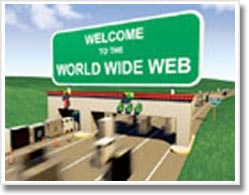Creativity - the crux of the 2nd generation web?
" It will be difficult for us to witness a million-dollar deal with Vietnam's Web 2.0 services, although more or less of them take up a number of users. We have not yet come up with anything new. By the time of Web 3.0, will we have it? "
There is nothing much to say about the successes of the current generation of Web 2.0. That success despite being exaggerated by oligarchs but looking at the results, everyone had to nod. The web has a lot of popularity and Web 2.0 creates a community that has personal imprints and "big things" ego.
Look back
In your opinion, the power of Web 2.0 comes from technology or data? Technology, AJAX's contribution is typical, data is thanks to the strong participation of users. Who is better?
 In my opinion, the success of Web 2.0 stems from the idea. The idea of Asynchronous JavaScript and XML combination to create a faster data exchange solution with Server, the idea of YouTube for video sharing, to Flickr for photo galleries, and Gmail for mail clients to be more vivid. , about MySpace or Facebook for social networking, the idea of blogs for those who like to write, and so on.
In my opinion, the success of Web 2.0 stems from the idea. The idea of Asynchronous JavaScript and XML combination to create a faster data exchange solution with Server, the idea of YouTube for video sharing, to Flickr for photo galleries, and Gmail for mail clients to be more vivid. , about MySpace or Facebook for social networking, the idea of blogs for those who like to write, and so on.
A development and business idea is the source of all success. Of course, a successful convergence of many factors but the mark of creativity is the biggest point of Web 2.0. In an age where everything can be copied, new ideas sometimes cost up to several hundred million or tens of billions of dollars for a business deal - something many people think of after the dotcom ball deflated.
An idea that is in the head can be kept private for a certain period of time. But when it is deployed, it will be very soon someone will copy the whole idea and succeed before you. Because of that, most Web 2.0 services are deployed very quickly and are promoted very fast. People will choose Java, ASP.net, and so on, but the class uses the Scripting languages like PHP to quickly realize their ideas. They aim to service the end users, so in terms of technical factors, it is not required to be difficult but to be fast and sensitive to dominate the market before others start.
Fast is a feature that represents both technical and business aspects of Web 2.0 successes.
Vietnamese people - buffalo slowly drink muddy water?
Copy and perfect the strong points of Asian people including Vietnamese. In the field of Web, we have no real creations that often copy the idea of the world to deploy the Vietnamese user community. Not discussing technology level because that is not the main reason for slowing down in Web 2.0 creation. As mentioned above, most successful Web 2.0 services do not require much difficulty.
Slowing down and lack of creativity can blame for firm eating, wear in culture, and blame the buoyancy environment - copy, blame the humble self-deprecating nature, . And then we witnessed a series of 'pure Vietnamese' Web 2.0 services that were born late. In the past 2 years, Vietnam has the service of sharing photos, blogging, videos, music, social networks, . like hundreds of blooming flowers. Does that flower make a delicious fruit, sweet fruit?
Who dares to think?
 Copying is not necessarily a crime, but if I copy the idea, others can copy it too. Success in the world does not mean that it will succeed in Vietnam. The Internet has flattened the globe, the services for Americans, the Vietnamese can also be used. Culture, it is difficult to score with sharing photos, videos, blogs, wikis or community networks. In particular, the psychology of foreign customers, a Web 2.0 service of Vietnam does not dominate the Vietnamese market.
Copying is not necessarily a crime, but if I copy the idea, others can copy it too. Success in the world does not mean that it will succeed in Vietnam. The Internet has flattened the globe, the services for Americans, the Vietnamese can also be used. Culture, it is difficult to score with sharing photos, videos, blogs, wikis or community networks. In particular, the psychology of foreign customers, a Web 2.0 service of Vietnam does not dominate the Vietnamese market.
So we need to be creative, to get successes that don't require much technology.
In the Web 2.0 era, before copying foreign service models, few companies surveyed for creativity promised success. Most of them are original copies that are chalked with a dazzling winter color. Mostly, it means that there are still some services left in some places that are 'suitable for Vietnamese culture'. But those creative points are just spoiled or less effective, so they are not so attractive to users. In Vietnam, people still blog on Yahoo 360, search with Google, share videos with YouTube, definitions at Wikipedia, etc. It will be hard for us to witness a million-dollar deal with translations. Vietnam's Web 2.0 service, though more or less, takes up a number of users. Be creative and develop ideas despite the ability to succeed less than 5%. Who dare?
We have not come up with something new, but by the time of Web 3.0, will we have it?
Nhu Dinh Thuan